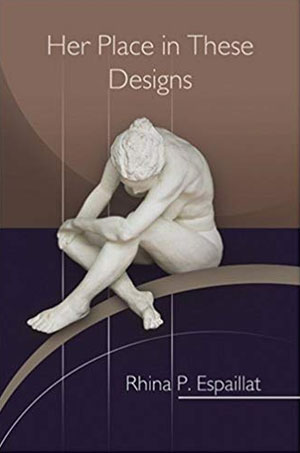Her Place in These Designs - Poems

Buy Now:
Her Place in These Designs
From her early childhood in the Dominican Republic, Rhina Espaillat learned the pleasures of traditional lyric poetry with wordplay, repetition, and patterns of sounds that allow for interplay between sound and sense. In this engaging and sensitive collection of poetry, she illuminates what is universal in women's lives and draws our attention to the humanly touching experiences.
~~
The poems are terrific: moving, intelligent, authentically felt and beautifully musical. When Espaillat works in rhyme and meter, which she does frequently, the power of her narratives and perceptions transcends their difficult forms.—San Diego Union-Tribune, 2010
Her body of meticulously crafted formal poems places her among the best poets of the last half-century. To match their variegated diction, range of subjects, and depth of thought and feeling, one must turn to her slightly elder peers, Richard Wilbur and the late Anthony Hecht for comparison. . . . Though modern in their intellectual skepticism and religious uncertainty, her poems do not succumb to despair or moral relativism. Espaillat is a poet of hope.—First Things
Order, of course, characterizes Rhina P. Espaillat s poetry. In this collection, nearly every poem is either metrical or syllabic...There are sestinas, rich in thought and imagery, that sound like musical prose in spite of the repetitious end scheme, and villanelles that avoid the endemic monotony of the form by the similarly engrossing things they are saying and also by the wide liberties the poet takes with words inside the repeated lines. Espaillat s order never drones. It keeps encountering small discords, ironic parentheses, and surprising words. All the poems, as widely as they range, speak with the same womanly and very human voice. This is a wonderful book.—Rattle
Her body of meticulously crafted formal poems places her among the best poets of the last half-century. To match their variegated diction, range of subjects, and depth of thought and feeling, one must turn to her slightly elder peers, Richard Wilbur and the late Anthony Hecht for comparison. . . . Though modern in their intellectual skepticism and religious uncertainty, her poems do not succumb to despair or moral relativism. Espaillat is a poet of hope.—First Things
Order, of course, characterizes Rhina P. Espaillat s poetry. In this collection, nearly every poem is either metrical or syllabic...There are sestinas, rich in thought and imagery, that sound like musical prose in spite of the repetitious end scheme, and villanelles that avoid the endemic monotony of the form by the similarly engrossing things they are saying and also by the wide liberties the poet takes with words inside the repeated lines. Espaillat s order never drones. It keeps encountering small discords, ironic parentheses, and surprising words. All the poems, as widely as they range, speak with the same womanly and very human voice. This is a wonderful book.—Rattle





